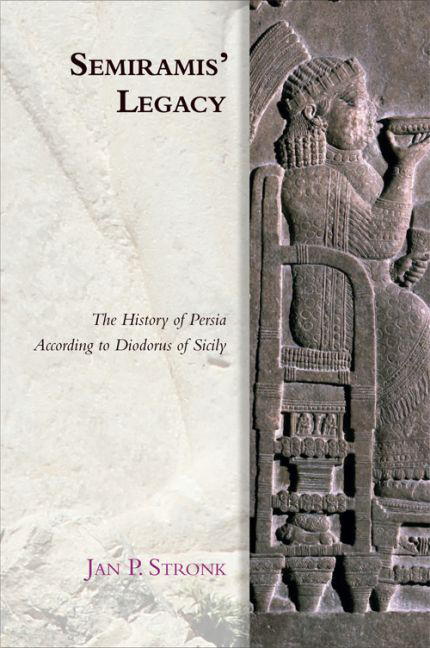Book contents
- Frontmatter
- Contents
- List of Figures and Tables
- Preface
- Abbreviations
- Series Editor's Preface
- Map
- Introduction: Diodorus' Work and Our Sources
- 1 Diodorus’ Sources
- 2 Ancient History: Assyrians, Chaldeans, and Medes
- 3 The Persians and the Greek Wars
- 4 Revolt and Sedition
- 5 Alexander the Great Defeats Darius III
- 6 From Persepolis to Babylon
- 7 The Period of the Diadochs: The Rift Opens
- 8 The Period of the Diadochs: The Rift Deepens
- 9 The Vicissitudes of the Diadoch Kingdoms: The Final Years of Diodorus' Persian Account
- 10 Semiramis' Legacy
- Conclusion
- Bibliography
- Index of Classical Sources
- Index of Modern Authors
- General Index
Preface
Published online by Cambridge University Press: 10 May 2017
- Frontmatter
- Contents
- List of Figures and Tables
- Preface
- Abbreviations
- Series Editor's Preface
- Map
- Introduction: Diodorus' Work and Our Sources
- 1 Diodorus’ Sources
- 2 Ancient History: Assyrians, Chaldeans, and Medes
- 3 The Persians and the Greek Wars
- 4 Revolt and Sedition
- 5 Alexander the Great Defeats Darius III
- 6 From Persepolis to Babylon
- 7 The Period of the Diadochs: The Rift Opens
- 8 The Period of the Diadochs: The Rift Deepens
- 9 The Vicissitudes of the Diadoch Kingdoms: The Final Years of Diodorus' Persian Account
- 10 Semiramis' Legacy
- Conclusion
- Bibliography
- Index of Classical Sources
- Index of Modern Authors
- General Index
Summary
Composing the present book, I had to make several choices. First of all, of course, was the choice of which parts of Diodorus’ work to include, which parts to leave out. The second choice involved the problem of how to translate the selected parts. I have opted to follow the original as closely as possible, but to apply a freer approach wherever I could or occasionally even had to. This way, I hope to have done the talents of Diodorus as much justice as he – in my view – undoubtedly deserves. The next choice was the most difficult one. To be of optimum use to the reader, the text at several places needs clarification, elaboration, and/or additional literature to get a wider (sometimes a better) perspective on the story as Diodorus relates it to us. This goal could partly be achieved in the Introduction, Chapter 1 (providing some general background), and Chapter 10 (providing some more background and the beginning of a synthesis), partly in the footnotes of the chapters that contain the translation of Diodorus’ account.
However, a full commentary on Diodorus’ text was obviously impossible within the framework of this book, and not only because it would require a book at least thrice as voluminous. It would, moreover, involve the risk that Diodorus’ very account in its context would be overlooked: at this stage of reassessment of his work I found this risk unacceptable. Regrettably, this decision meant that much (recent and less recent) literature had to be left out. On the other hand, providing too little information (part of which may well have been more or less general knowledge among the pepaideumenoi in Diodorus’ days) would also do no justice to Diodorus’ account, which should – as indicated – be the most important feature of this book. I hope that the choices I have made in the comments will, on the one hand, make the reader realise what problems Diodorus faced and how he coped with them, and, on the other, make the notes serve as an incentive to explore the world of Persian history further.
- Type
- Chapter
- Information
- Semiramis' LegacyThe History of Persia According to Diodorus of Sicily, pp. ix - xiPublisher: Edinburgh University PressPrint publication year: 2017



